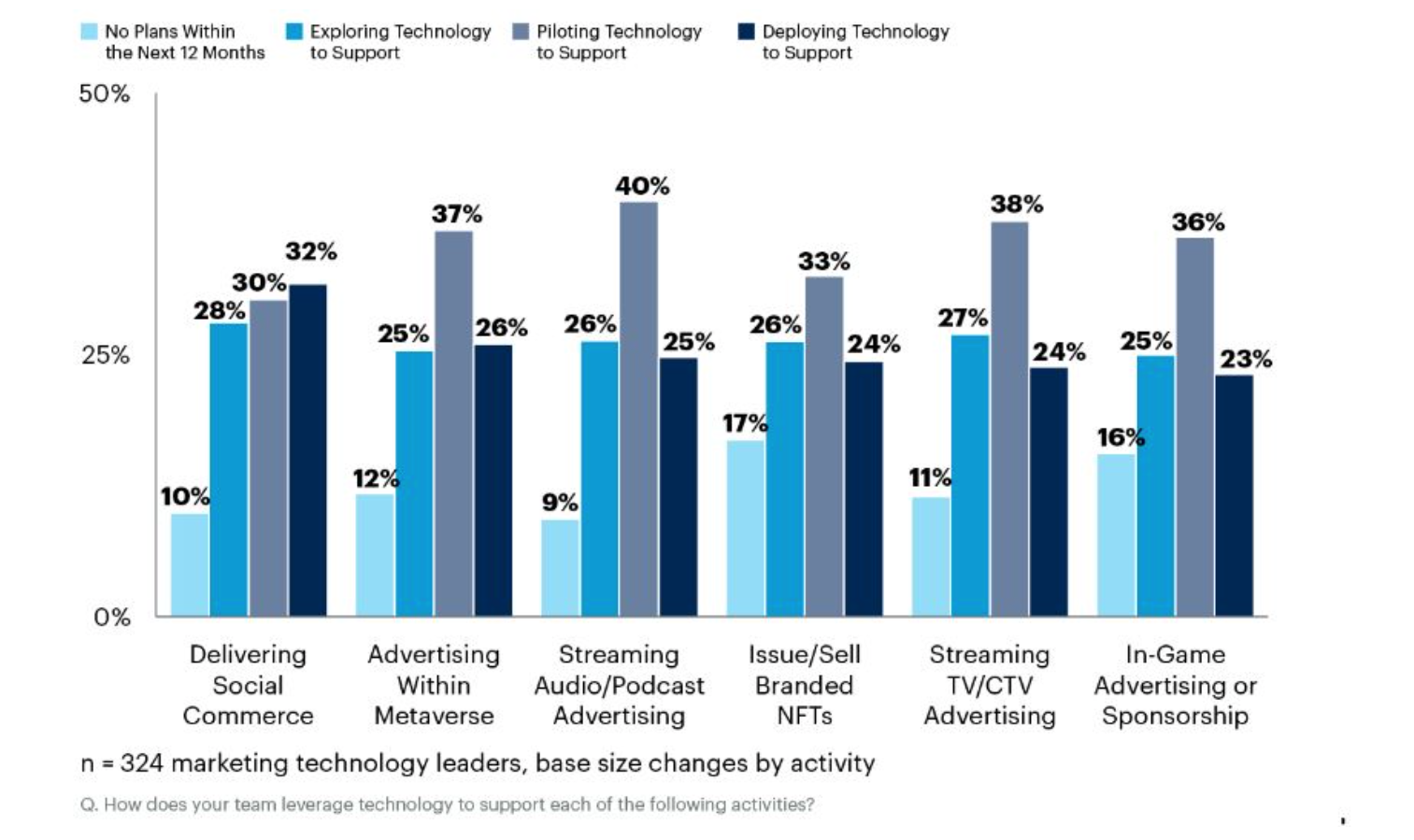
source: martech.org
The advent of Marketing Technology, or MarTech, has catalyzed a transformative shift in the digital marketing domain, marking a new era where engagement strategies become more refined, targeted, and impactful. This evolution goes beyond traditional marketing paradigms, introducing a digital ecosystem where brands can navigate with unprecedented agility and precision. MarTech’s emergence as a pivotal force in marketing has not only redefined the interaction between brands and their audience but has also set a new standard for creating personalized customer experiences. Through an intricate array of tools and software, businesses are now equipped to fine-tune their marketing strategies, ensuring they resonate more profoundly with their target demographics. This guide aims to unfold the multifaceted nature of MarTech, exploring its core components, its strategic application within various business models, and its potential to shape the future of marketing in an increasingly digital world.
What is Martech?
At its core, MarTech represents the fusion of marketing and technology, serving as the backbone for modern digital marketing strategies. This integration encompasses an extensive range of tools and software, each designed to enhance various facets of marketing—from the initial creation of digital content to the intricate analysis of campaign data. MarTech’s broad spectrum includes, but is not limited to, digital advertising platforms, content management systems (CMS), data analytics tools, and customer relationship management (CRM) software. Each component plays a critical role in streamlining marketing operations, enabling marketers to launch, monitor, and refine campaigns with a level of precision previously unattainable.
The essence of MarTech lies in its ability to transform raw data into actionable insights, thereby making marketing efforts not only more efficient but also more effective. By harnessing the power of MarTech, businesses can achieve a granular understanding of their audience’s preferences and behaviors, allowing for the delivery of highly personalized marketing messages. This capability to tailor marketing strategies to the individual level is what sets MarTech apart, marking a departure from the one-size-fits-all approach that characterized the early days of digital marketing.
MarTech’s significance extends beyond mere campaign management. It is about building a cohesive, omnichannel experience that engages customers across multiple touchpoints. Whether it’s through social media, email, web, or mobile applications, MarTech provides the tools necessary to create a seamless and integrated customer journey. This holistic approach to marketing not only enhances customer satisfaction but also fosters brand loyalty, ultimately driving business growth.
The Components of a MarTech Stack
The architecture of a MarTech stack is foundational to the digital prowess of any marketing team, serving as the technological bedrock upon which strategies are built and executed. This stack is not a one-size-fits-all assembly but a carefully curated collection of technologies tailored to meet the unique demands of each organization. The size of the company, the industry it operates within, and the specific goals it aims to achieve through its marketing efforts dictate the complexity and composition of the stack. Among the myriad of tools available, several stand out for their universal applicability and transformative potential.
CRM software emerges as the cornerstone of effective customer data management, offering a centralized repository for customer information. This tool goes beyond mere data storage, enabling businesses to segment their audience, track customer interactions, and deliver highly personalized marketing messages. The power of CRM lies in its ability to foster deeper, more meaningful relationships with customers by understanding their needs and preferences.
Email marketing tools play a pivotal role in nurturing leads and maintaining customer engagement. With capabilities ranging from automated drip campaigns to sophisticated segmentation, these tools ensure that communication with prospects and customers is both targeted and timely. The strength of email marketing lies in its directness and measurability, offering unparalleled insights into open rates, click-through rates, and overall engagement.
Analytics and data visualization platforms are the eyes through which marketers view the success of their campaigns. These platforms sift through vast amounts of data to unearth patterns, trends, and insights that inform strategic decisions. By visualizing data in an accessible and comprehensible manner, they allow marketers to adjust their strategies in real-time, optimizing for performance and ROI.
Content Management Systems (CMS) provide the infrastructure needed to manage digital content at scale. From website pages to blog posts, CMS platforms offer the flexibility and control required to publish, edit, and optimize content across various digital channels. Their significance lies in their ability to ensure that content not only reaches the target audience but also resonates with them, driving engagement and conversion.
Social media management solutions are crucial in today’s digitally connected world, where social media platforms serve as vital channels for customer interaction and brand visibility. These solutions enable marketers to schedule posts, monitor mentions, and engage with followers across multiple platforms from a single interface. The agility offered by social media management tools is indispensable in maintaining a consistent and responsive brand presence online.
Strategic Implementation of MarTech
Crafting a MarTech strategy that aligns with an organization’s marketing objectives is an exercise in precision and foresight. It starts with a comprehensive audit of the existing marketing ecosystem, identifying areas where technology can bridge gaps or enhance capabilities. The selection of MarTech tools is a deliberate process, guided by the organization’s overarching goals and the specific needs of its marketing team. Compatibility with existing systems and ease of integration are key considerations, ensuring a seamless workflow and minimizing disruptions.
The deployment of a MarTech stack is only the beginning. For these tools to deliver on their promise, widespread adoption and proficient use by the marketing team are essential. This often requires a structured training program, coupled with ongoing support, to empower team members to leverage these tools effectively. The true value of MarTech investments is realized when they become integral to the marketing process, driving efficiency, innovation, and measurable outcomes.
The strategic implementation of MarTech is a dynamic and ongoing process. It demands a balance between technological innovation and human expertise, where the right tools are not only chosen but also adeptly integrated into the fabric of marketing operations. As the digital landscape evolves, so too must the MarTech stack, adapting to new challenges and capitalizing on emerging opportunities to drive marketing success.
The Road Through MarTech Difficulties
The journey through the MarTech landscape is fraught with challenges that demand both strategic foresight and operational agility. As the digital ecosystem continues to expand, the sheer volume of MarTech solutions available can overwhelm even the most seasoned marketing professionals. This abundance of choice, while beneficial, necessitates a discerning eye to identify tools that not only align with specific marketing objectives but also integrate seamlessly with the existing technological infrastructure. The task is akin to finding the perfect piece in a complex puzzle, where each tool must fit precisely within the broader marketing strategy to create a cohesive and functional whole.
Integration presents another formidable challenge, as new tools must be woven into the fabric of established marketing workflows without disrupting ongoing operations. This process often requires a meticulous reevaluation of current practices and a willingness to adapt them to accommodate new technologies. Furthermore, the issue of data compatibility looms large, as disparate systems need to communicate flawlessly to provide a unified view of marketing activities. Achieving this level of interoperability is crucial for deriving actionable insights from data, necessitating a robust framework for data management and governance.
Addressing these challenges demands a proactive approach, where strategic planning is coupled with a commitment to ongoing education and skill development. As MarTech evolves, so too must the knowledge and capabilities of the marketing team, requiring a culture of continuous learning and adaptation. Flexibility becomes a key asset, allowing teams to pivot in response to new developments and integrate innovative solutions that enhance marketing effectiveness.
The Future of MarTech
Looking to the horizon, the future of MarTech is illuminated by the promise of artificial intelligence (AI) and machine learning (ML). These technologies stand at the forefront of innovation, offering the potential to revolutionize marketing by enabling personalized experiences at an unprecedented scale. AI and ML can sift through vast datasets to identify patterns and preferences, tailoring marketing messages to individual consumers with a degree of precision that was once the realm of science fiction. This capability not only enhances the relevance of marketing efforts but also elevates the customer experience, fostering deeper engagement and loyalty.

Source: gartner.com
The integration of AI and ML into MarTech tools will also enhance analytical capabilities, allowing marketers to extract deeper insights from their data. This evolution will enable predictive analytics, where marketing strategies can be informed by forecasts of future consumer behavior, allowing for more targeted and effective campaigns. The potential for optimization is vast, with AI-driven tools continuously learning and improving, ensuring that marketing efforts are always at the cutting edge of efficiency and effectiveness.
Amidst these technological advancements, the importance of data privacy and security becomes ever more pronounced. As marketers harness the power of data to drive their strategies, they must also navigate the complex landscape of regulatory compliance. The balance between leveraging data for marketing innovation and safeguarding consumer privacy is delicate, requiring a nuanced approach to data management. Adherence to privacy regulations not only protects consumers but also builds trust, a crucial currency in the digital age.
The future of MarTech is one of boundless potential, marked by the continuous evolution of technology and the ever-growing sophistication of marketing strategies. As AI and ML redefine what is possible, marketers must remain vigilant in their commitment to privacy and security, ensuring that the advancements in MarTech are leveraged responsibly and ethically. The journey ahead is one of exploration and discovery, where the possibilities are limited only by the imagination and ingenuity of those who navigate the MarTech landscape.
Conclusion
MarTech represents a powerful arsenal for marketers aiming to navigate the digital age with precision and creativity. By understanding its components, strategically implementing the right solutions, and staying attuned to future trends, businesses can harness the full potential of MarTech to drive growth and build lasting relationships with their customers. As the field continues to evolve, staying informed and adaptable will be key to leveraging MarTech effectively.




